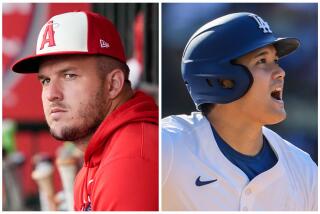Change is the theme in Major League Baseball
- Share via
Reporting from Milwaukee — Houston will be pushed from the National League Central to the American League West in 2013, a move Major League Baseball announced Thursday in conjunction with its unanimous approval of Jim Crane as the Astros’ new owner.
Also coming soon, perhaps as early as next season, is a second wild-card team to each league, meaning 10 of 30 teams would make the playoffs.
Commissioner Bud Selig, acting on the advice of a special committee for on-field matters, said the two wild-card teams from each league probably will play a one-game playoff to advance to the postseason with the three division winners.
“We haven’t made final decisions, but that’s what everyone [on the committee] wants,” Selig said after Thursday’s owners meeting. “And it will be dramatic.
“You play [162 games] all year and it could come down to one game. Some say it should be a two-out-of-three series, but now we’re putting a big weight on winning the division.”
Angels Manager Mike Scioscia, a member of Selig’s special committee, lobbied heavily for a system that rewarded division champions. He was not opposed to the wild card — his 2002 World Series-winning team was a wild-card entrant — but he thinks it should be tougher for a wild-card team to advance.
“That wild-card playoff game will be more exciting than any other game other than the World Series,” Angels pitcher Dan Haren said in an email. “But to play 162 games over a six-month span and have your fate decided by one game … that seems a bit rough.
“I’ve always thought the division series was too short as a five-game series, but hey, you better win your division now.”
Baseball’s first realignment since the Milwaukee Brewers switched from the AL to the NL in 1998 will create two 15-team leagues with three five-team divisions.
It will result in a more balanced schedule in which teams probably will play 72 games in their division, 60 games against teams in the other two divisions in their league and 30 interleague games.
It will also necessitate the playing of interleague games throughout the season.
“No schedule is ever perfect,” Selig said, “but this will be very good.”
Houston’s move will expand an intrastate rivalry with the Texas Rangers, but with three AL West teams on the West Coast, including Seattle in the Pacific Northwest, the Astros will probably triple their travel miles within their division.
“I was in the air freight business and always flew a lot,” Crane said, “so we’ll be flying a lot.”
Crane, whose $680-million purchase of the team from Drayton McLane was reduced by $70 million in exchange for agreeing to move to the AL West, made previous attempts to buy the Astros, Rangers and Chicago Cubs.
“This feels very good,” said Crane, a Houston businessman. “I’ve been trying for a long time [to buy a team]. For those who don’t know me, I’m from Missouri, and we’re sort of stubborn. Stubborn like a mule.”
The theme of the day was change, but Selig said there has been no motion by owners to eliminate the designated hitter, which the AL began using in 1973. Pitchers have always hit in the NL.
“It would take something I would describe as a cataclysmic event for that to happen,” Selig said. “What could that be? Geographical realignment? I don’t see that. The game is fine as it is. I’ll say this. The [DH rule] doesn’t bother fans.”
Baseball also appears to be on the verge of a new five-year collective bargaining agreement that would ensure 21 consecutive years of labor peace, a monumental achievement for a sport whose World Series was canceled in 1994. The new pact could be finalized as early as Monday.
“I’m really confident,” Rob Manfred, MLB executive vice president, said of negotiations with the players’ union. “I’m hopeful we’ll push it across the finish line.”
twitter.com/MikeDiGiovanna
More to Read
Go beyond the scoreboard
Get the latest on L.A.'s teams in the daily Sports Report newsletter.
You may occasionally receive promotional content from the Los Angeles Times.











